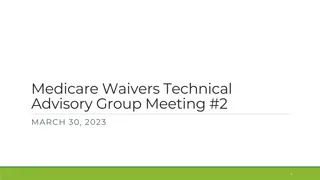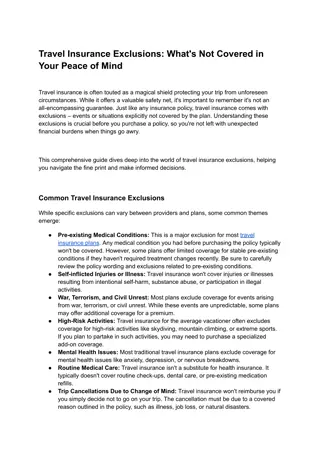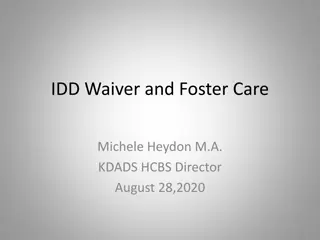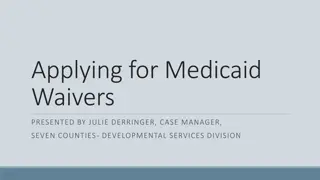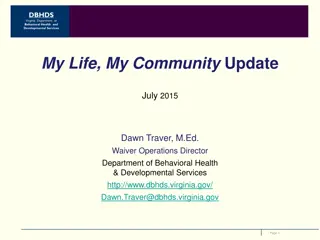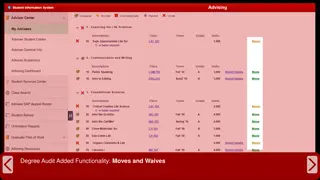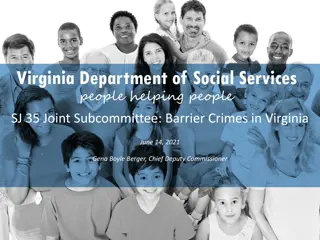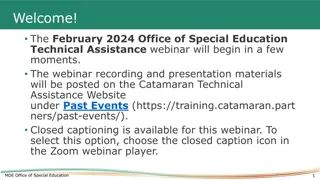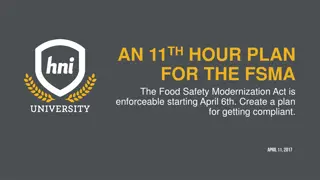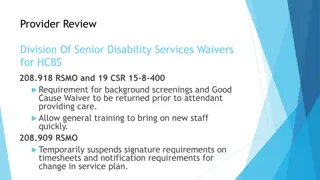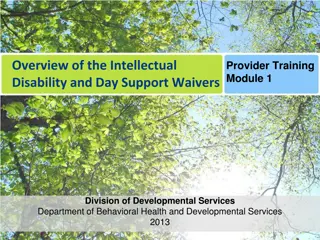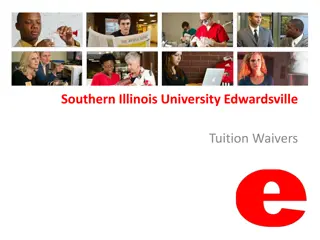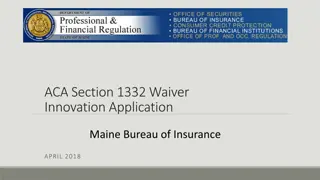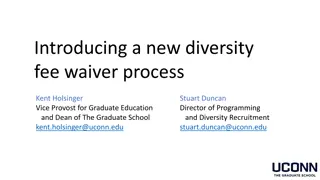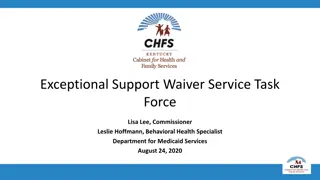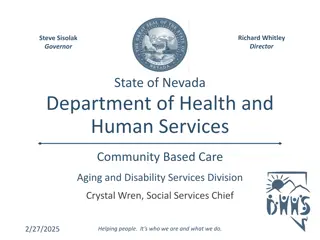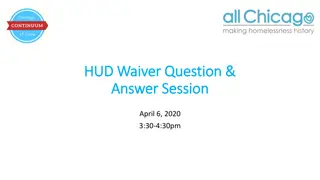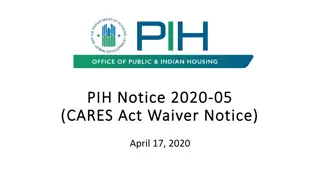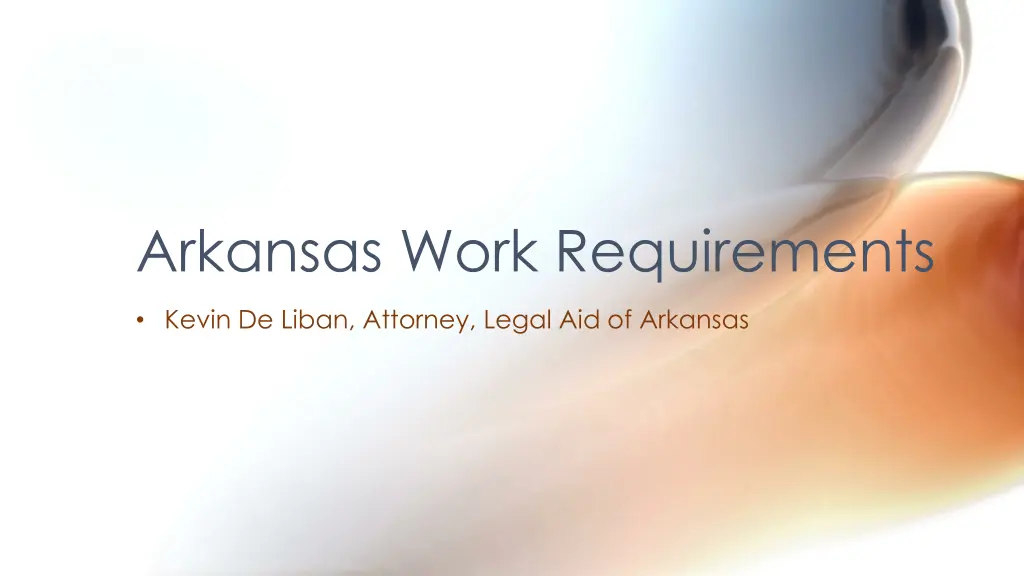
Arkansas Work Requirements and Key Data Points
Learn about the Arkansas work requirements implemented by Kevin De Liban, Attorney at Legal Aid of Arkansas, along with key data points regarding recipients, compliance rates, and termination statistics. Understand the challenges faced and the impact of the work requirements on individuals in Arkansas.
Download Presentation

Please find below an Image/Link to download the presentation.
The content on the website is provided AS IS for your information and personal use only. It may not be sold, licensed, or shared on other websites without obtaining consent from the author. If you encounter any issues during the download, it is possible that the publisher has removed the file from their server.
You are allowed to download the files provided on this website for personal or commercial use, subject to the condition that they are used lawfully. All files are the property of their respective owners.
The content on the website is provided AS IS for your information and personal use only. It may not be sold, licensed, or shared on other websites without obtaining consent from the author.
E N D
Presentation Transcript
Arkansas Work Requirements Kevin De Liban, Attorney, Legal Aid of Arkansas
The Beautiful Road Map Dilemma We have a beautiful road map of how not to do it. Dr. Jennifer Walthall, Secretary, Indiana Family and Social Services Administration (Indianapolis Star, 1/22/19)
Features 80 hours of work/ volunteer /job search OR exemption (self-attested) Any three months of non-compliance=termination Online-only reporting (as of 12/19/18, limited phone is possible) Reporting website closed 9 p.m. to 7 a.m. Linking accounts through reference number County office kiosks, but no additional staff/workers Auto-exemptions through data matching
Key Number-Based Data Points 57% of recipients work; 23% have a disability; 12% caretakers 18,164 terminated in five months 23.4% of the 77,617 people subject to work requirements For every 1 person who may not be working or have an exemption, state is terminating 2 people who do ~80-90% of people who must report (i.e. not auto-exempted) do NOT In any given month, just 2% of all people subject to WR report compliance
Key Number-Based Data Points Fewer than 1% of people subject to the work requirements have newly reported work hours Nothing suggests they did so in response to work requirements Only 966 of the 18,000+ terminated have signed back up Data gaps: administrative costs, county-level, tracking individuals, pre-WR data on individuals, lack of evaluation plan No additional money spent on (1) DHS staff; (2) job training; (3) work supports (childcare, transportation, etc.)
Other Data Points (experience is evidence) Have to be healthy to work, be involved in community/family, etc. Lack of knowledge of WR Difficulty complying Inconsistent low-wage work; meaningless job training Frustration long wait times, rudeness, DHS worker limits Other hoops increased verification and churn
Outreach and Education Community meetings and events Client database (letters, neighborhoods, etc.) Libraries, gas stations, convenience stores, churches Front-line providers Community health clinics and rural doctors offices Mental health clinics; substance use treatment facilities Homeless service providers Pharmacists Provider groups or associations Colleges and campus groups (with 19-29 year olds)
Outreach and Education Electronic Boosted Facebook posts with videos E-mails/updates to interested parties IG/Snapchat (?); direct texts (?) Media Lets clients know about the issue and help available Explains real-life impact
Working with Media What do clients or affected individuals want to do? What are your goals? What is the story? What is your angle on the story? What are reporter deadlines? How to manage competing outlets? In-state or national Print or visual Expertise Track record
Working with Other Organizations How does this fit with larger org goals? Identify each org s strengths and unique capabilities Understand limitations and political realities Joint presentations and speaking opportunities Consider media interaction/roles Discuss data, stories, developments; regular feedback Think of nat l orgs (CBPP, KFF, Georgetown CCF, YI, etc.)
Working with Legal Aid Orgs Federal funding comes with some limitations. We CANNOT: Attempt to influence legislation/rulemaking or do grassroots lobbying Participate in class action lawsuits Initiate the formation of coalitions Represent immigrants without status (in most situations) WE CAN: talk to media, analyze and explain impact, offer public comments, inform clients, educate public, testify at legislature, sue in a meaningful way Resources 1 attorney for every 18,000 financially eligible people Possibility of political reprisal (especially if org receives state funds)
Parting Considerations Is there a way work requirements can work? 1/10/19 CBPP publication explains why not PBS Newshour, 11/19/18 (Catherine Rampell) https://www.arktimes.com/arkansas/when-arkansas-works- doesnt/Content?oid=25890378 Will lack of work requirements threaten program future? Will organizations change positions as time goes on in response to pressures or other goals? How to manage?
Happy to Help Kevin De Liban, Attorney, Legal Aid of Arkansas 800-967-9224 x 2206 kdeliban@arlegalaid.org


